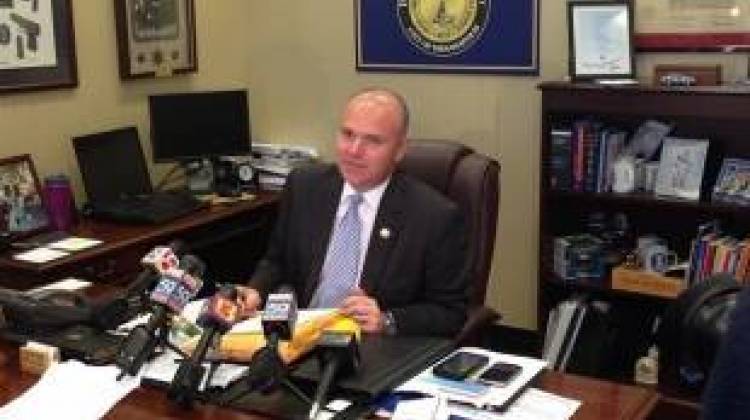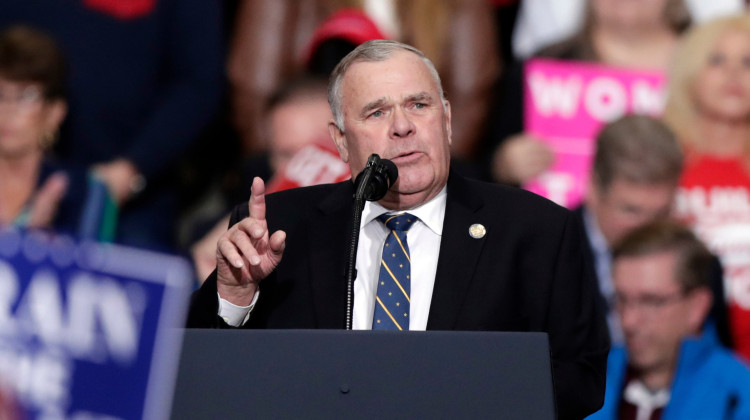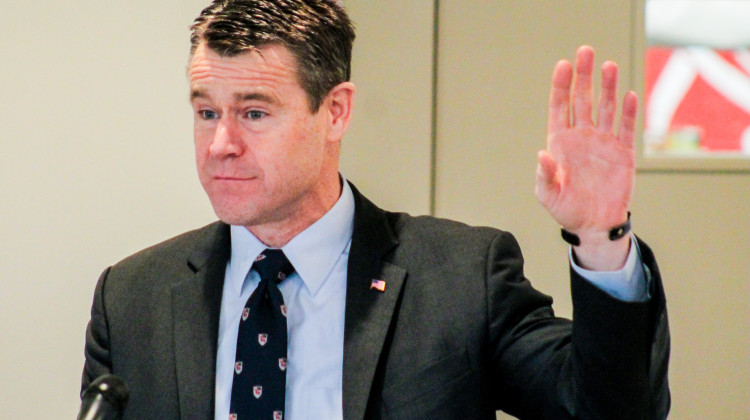In the first part of a conversation with Indianapolis Department of Public Safety Director Troy Riggs taking a look back at 2014, WFYI's Christopher Ayers discussed the city’s rising murder rate, as well as new ways DPS is trying to attack the root causes of crime in the city.
In this second part of the conversation, Riggs talked about the tragedy that struck IMPD this summer and what it says about officer safety; reforms DPS has undertaken to try and improve relationships between police and community; and concerns that there may be too few officers on the street.
CHRISTOPHER AYERS: This summer was a tough time for IMPD—and for the city—with the death of Officer Perry Renn—but I feel like we’ve heard more reports about officers being shot at or officers having to use their weapon than we have in recent memory. Is this a particularly dangerous time for officers out there doing their jobs?
TROY RIGGS: I think for any person wearing a uniform today for any police agency, it’s a very dangerous time. And when you have groups of individuals chanting “kill a police officer”—when you hear that in major cities across the nation—fortunately we have not heard that in Indianapolis. But the number of officers involved in deadly conflicts or confrontations since I’ve been here has been very troublesome to me.
It does prove that the chief is putting the officers in the right place in the right times, and it does prove the brave work that they do each and every day. But we’ve lost two officers in the last two years—tragically. And both of those two individuals were acting heroically. But we’ve also had thirty-plus incidents where officers have either been fired upon or where they’ve had to fire toward someone else to protect their life. That is a large number for two years—it’s probably the greatest number in the history of this city that I know of, that anyone’s been able to show me with data, and that is a concern.
There’s no tougher job that I know of then to be a police officer on frontlines day in and day out, other than someone that’s bravely serving in the military for this nation.
While Riggs says he is concerned about the frequency of violence IMPD officers are confronted with, he says DPS spent much of 20-14 finding ways to improve relationships with the community at large.
He says a key part of this has been revamping both IMPD’s disciplinary process for officers and its citizen complaint process, which he says was slow and cumbersome when he first arrived. Riggs says that giving IMPD Chief Rick Hite control over the disciplinary process and streamlining the citizen complaint process has increased response times, giving both residents and officers resolution for complaints much faster than in the past.
TR: So that’s one of many steps we have to take to show the public that we’re serious about discipline, and that we’re making sure our officers are behaving appropriately—administratively and criminally. And I can say this—a lot of the changes we made and the recommendations to strengthen this came from our workforce because they want to be known as a department of integrity and honor.
Now those are just a couple of things—but you have to realize—in order to earn trust with the public and make sure that we have a working relationship, we were doing community conversations—making sure that we’re being responsible to them and accountable to them.
We have been working on body cameras long before Ferguson became an issue, because we want people to see what we’re doing day-in and day-out in our police department.
We have done this and many other things, including looking at the way we hire to look at the diversity within the ranks of DPS to make sure that we’re getting the best and the brightest in the city of Indianapolis.
We have worked very hard on recruitment. The last two classes we’ve had on the police department and the last class for the fire department was very much in line with the racial makeup of our community. We didn’t change the test—what we did was go out and recruit the young people in our community—that’s a diverse group—and, as a result, we got a diverse class. We’ve done all that to earn the trust, and we have to continue to work, to earn the trust and respect of every citizen within Indianapolis.
CA: I want to ask you about the staffing situation. I know that back in April, the IMPD Staffing Commission recommended increasing the force by about 230 officers by 2018. The commission laid out a few ways to reach that goal—the council didn’t necessarily take them up on ALL of those recommendations—how successful of a year was 2014 in addressing those staffing issues
TR: Well, we’ve been addressing this since I arrived at the very end of 2012, and a lot of people were asking about the low number of officers just simply because of the recession in 2008. This city was able to weather it, and it’s remarkable, without laying off anyone, but it wasn’t hiring anyone as a result either.
But before I would ever ask for additional funding for officers, I wanted to make sure we were doing our due diligence in being as lean as possible—effective and efficient. So we started looking at allocation of personnel and found out we had far too few officers actually working the streets of Indianapolis. The chief [IMPD Chief Rick Hite] has worked through the process since then. He’s in between 120 and 150 officers—moving them back to the streets of Indianapolis, which is a plus gain for us on the streets where it matters—boots on the ground.
At that point, we said we needed an additional 100 to 200 officers to take the strain off of our police officers because of the stress and the workload that they were enduring. We asked for additional officers—we were not able to get them immediately. The council put a committee to study for a while—came up with the same number that we come up with, and they have given additional funding for approximately 30 or 40 officers. I think it’s also important to point out that within our own budget, we found enough savings within the police department, to hire fifty additional officers each year for the next three or four years.
That’s significant. The Department of Public Safety and the police department worked very hard to take a budget that was having trouble purchasing, quite frankly, toilet paper and soap for sub-stations when we arrived—took that same budget and found enough money to hire fifty officers. Now with the additional money coming in from the council, we’re going to be able to hire 90 officers this year, at least 90 officers next year. We’re one of the few major cities that’s hiring above the retirement rate now. We believe in the next three to four years we’ll have as many as 125 to 200 additional officers as a result of this.
CA: This has been a pretty busy year for DPS, so what can we expect from you in 2015?
TR: Well, we’re not going to slow down, I can assure you that. We have been extremely busy. I would put our work product, the quality of our work over the last few years up against any city in America. We are leading the nation in the way we are handling the heroin growth across this nation; we’re leading the nation in data-driven government; we are leading the nation in the way we are using business plans and good efficient and effective government.
The good news is that a lot of that hard work building that foundation, a lot of the hard work making sure we are in the right position has been done—and I really believe that our workforce is on the precipice of doing some significant things for this city that will be emulated by other departments throughout this country, and I certainly believe that is within our grasp in 2015.
Parts of this interview were edited for time and clarity.
You can find the first part of the interview with Public Safety Director Troy Riggs here.
 DONATE
DONATE







 Support WFYI. We can't do it without you.
Support WFYI. We can't do it without you.